

 The Accurate Reloading Forums
The Accurate Reloading Forums  THE ACCURATE RELOADING.COM FORUMS
THE ACCURATE RELOADING.COM FORUMS  Hunting
Hunting  Hogs, Warthogs, Wild Boars, Javelinas Hunting
Hogs, Warthogs, Wild Boars, Javelinas Hunting  What are you FL pig-hunters doing?
What are you FL pig-hunters doing?Go  | New  | Find  | Notify  | Tools  | Reply  |  |
| One of Us |
I really enjoy this forum, probably because I know so little about US pig hunting. Some questions from the photos: What are you sawing up the carcasses with? Which part of the meat do you keep and how do you prepare it? Why the need for gloves? Also, what rifles and what loads? thanks in advance! | ||
|
| One of Us |
Not my post but I'll answer That looks like a reciprocating saw to me...makes quick work of the job I wear gloves since I don't have a well where I hunt....easier clean up if I did Guns and loads= everything from 22lr to whatever you own/want to try out. (.22 for the pigs in traps) Robert If we can prevent the government from wasting the labors of the people, under the pretense of taking care of them, they must become happy. Thomas Jefferson, 1802 | |||
|
| Moderator |
We normally wear gloves because of the presence of swine brucelosis. I know folks who have contracted it from skinning hogs without the protection of gloves when they had cuts on their hands. I usually only keep the shoulders, hams and back straps. The ribs are usually too lean to bother with. I don't even crack the chest open when skinning. I have taken them with .30-06, .338 win mag, .416 Remington Magnum, .458 Lott, .44 magnum, .454 Casul, .480 Ruger, .475 Linebaugh and I'm sure I am missing a few........ "Ignorance you can correct, you can't fix stupid." JWP If stupidity hurt, a lot of people would be walking around screaming. Semper Fidelis "Building Carpal Tunnel one round at a time" | |||
|
| One of Us |
Karoo, Lets see I’m not from Florida, but here are some of the implements I have been known to use when butchering Texas hill country porkers. 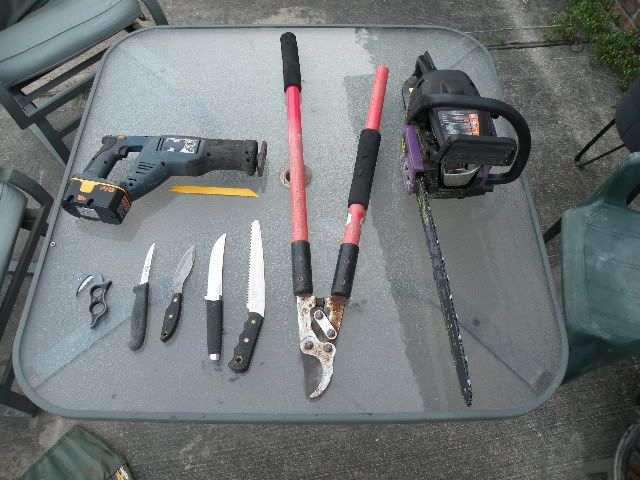 Top row: battery operated reciprocating saw, compound loppers, chainsaw, The reciprocating saw is good for cutting the ribs off the backbone, the backbone from the quarters and splitting the pelvis. Compound loppers work well at cutting front and back feet at wrist and ankle joint. Also work well cutting backbone from quarters. Chainsaw works when you have an extremely tough boar that you’re not going to eat. Just saw him in half behind the front legs and toss him in the truck. 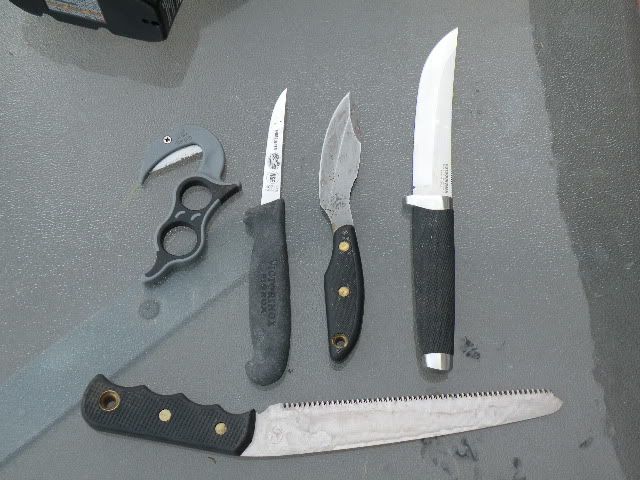 Bottom row: gerber e-z zip, victronix/forschner boning knife, Knives of Alaska Yukon Belt knife, Cold Steel Outdoorsman, Knives of Alaska Bone saw. The e-z zip is a takeoff of the Wyoming knife but does not have a second blade on the backside. I always am nicking my knuckles on the second blade of the Wyoming knife. Works great for zipping hogs open from stem to stern. Victronix boning knife is good for opening up skin on forelegs and separating muscles when boning out. The Yukon belt knife has a great shape for caping/skinning. Its D2 steel and holds an edge. Cold steel outdoorsman has enough heft to split a brisket. Bone saw works well when you are energetic and don’t want to use a reciprocating saw. Also works well for splitting brisket. As to what part of the meat. I keep everything but the feet, hide, entrails and head. I skin and gut my hog first. Next I wash him down. I generally take the tenders out first. Then the front quarters. Next I cut out the backstraps or loins. I then saw off the ribs along the backbone. The reciprocating saw makes short work of this. After I’ve taken the ribs, I cut the backbone off above the pelvis leaving the hams. I Split the pelvis and then cut off the back feet at the hocks. I season and grill the tenders. The loins I grill or make butterfly steaks. The ribs I braise on a grill then slather with different rubs, sauces or marinades and place in a cooking bag and cook at 250 degrees F for 4 to 6 hours till they fall off the bone. The hind quarters I will cook like roasts by separating out the muscles or slow cooking in a browning bag like the ribs. The meat can also be mixed with venison or audad sheep to make sausage or just plain pork sausage or you can cut into steaks or pork chops. Great stuff. Agree with Whitworth about wearing gloves. I also wear a cut resistant skinning glove to avoid nicks and cuts on the offhand. As to what to shoot them with. I have killed hogs with everything from a 22 hornet to 45-70. A hogs anatomy is different in that his heart is very low in his chest, being just behind his front leg at the bottom of his chest. Shoot them like a deer and you will miss the heart. Shoot them about two inches below the ear on a line between the ear and shoulder and you sever their vertebrae and they drop and paddle. DRT. Just about any good stout bullet will work. Velocities above say 2,700 fps upon impact result in blood shot meat. Big heavy slow bullets allow you to eat right up to the bullet hole. Hope that helps GWB 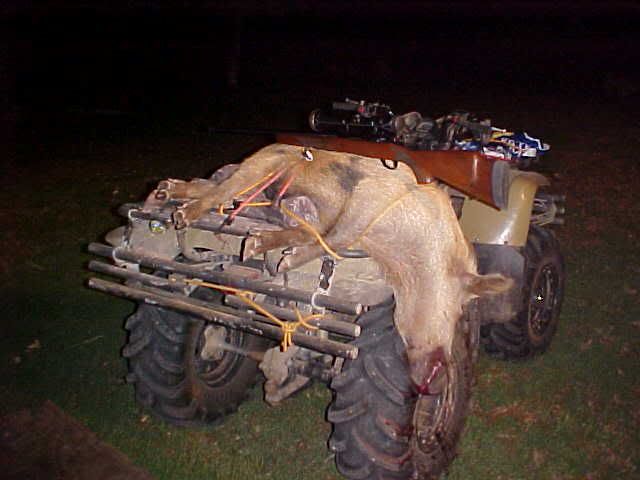 375 H&H vs. Hill Country Porker(s) 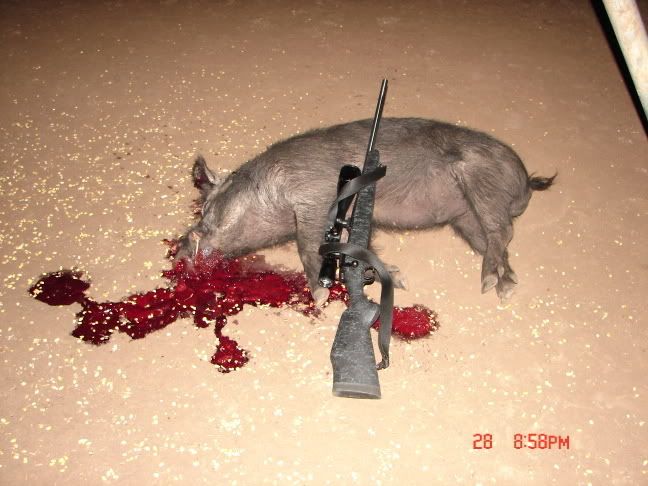 240 weatherby, 85 grain nosler partition some other hogs I have known 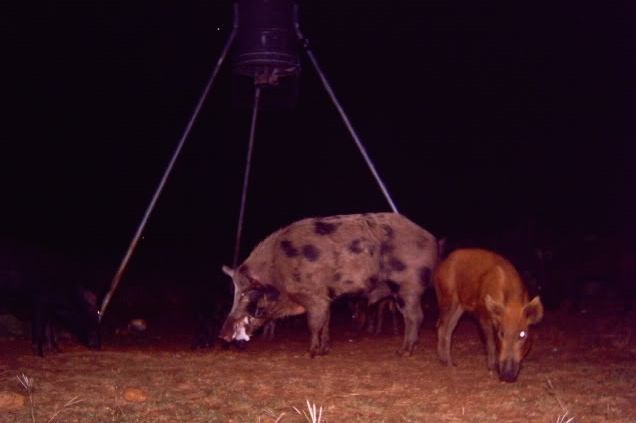  [IMG]http://i38.photobucket.com/albums/e129/glenn1221 | |||
|
| One of Us |
Thanks for all the details and very interesting stuff! | |||
|
| One of Us |
Pigs are pretty stout critters. For anything other than a central nervous system shot, I prefer a Barnes TSX. A large old boar can easily have a 1"+ fat gristle plate over the shoulders. The skin can be thick and hairy. On more than one occasion, I've not found the 1" exit wound from a .30 cal 168 gr TSX through the lungs until I've skinned the hog. But for a brain/spine shot, anything will work. In Texas, we consider it great sport to use larger caliber guns. A .375 H&H makes a great pig gun just because you can. One of my hunting partners uses a .450 Bushmaster on occasion. This is an AR15 variant shooting .458 caliber bullets. Another friend hasn't used anything other than a .22-250 on pigs for several years. A 50 grain VMax to the brain drops them right there. I'm a big fan of the cordless battery powered reciprocating saw. Why do the work if the electrons will do it for you? My prefered pig knife is a Puma White Hunter Often we don't keep any of the meat. Pigs are becoming a tremendous pest in Texas and damaging the habitat to the point of impacting deer quality and quantity. We might just shoot them and throw them in a ditch. On the other hand, they can be some fine eating too. So if I'm getting meat, I'll get at least the loins and maybe all the rest except the tenderloins. Most of the time I consider that too much work for too little meat. LWD | |||
|
| Powered by Social Strata |
| Please Wait. Your request is being processed... |
|
 The Accurate Reloading Forums
The Accurate Reloading Forums  THE ACCURATE RELOADING.COM FORUMS
THE ACCURATE RELOADING.COM FORUMS  Hunting
Hunting  Hogs, Warthogs, Wild Boars, Javelinas Hunting
Hogs, Warthogs, Wild Boars, Javelinas Hunting  What are you FL pig-hunters doing?
What are you FL pig-hunters doing?

Visit our on-line store for AR Memorabilia

